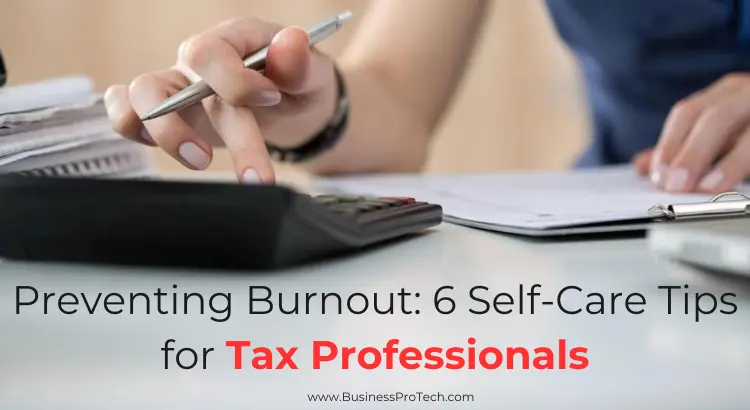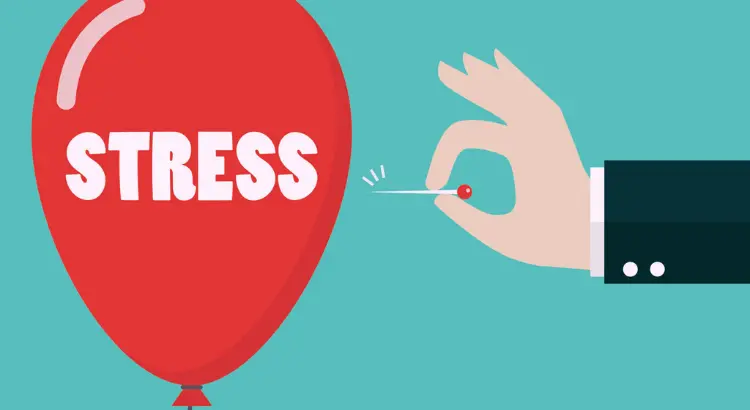If you’ve ever felt physically and mentally wiped out after a busy tax season (or even in the middle of one), you could suffer burnout. Burnout is a real danger in high-stress, fast-paced jobs, and tax season can take its toll. Many tax preparers work long hours for months from the end of December through April.
Long working hours, the prolonged stress of interpreting tax laws and working on returns—including complex cases like Expat tax filings—and failure to get sufficient rest can all take a toll on your health. So, it’s critically important to recognize the signs of potential burnout and implement self-care tactics to prevent it.
Here are some tips to help you build stress-fighting strategies into your daily routine, whether it’s tax season or off-season.

Learn to Recognize the Signs of Burnout
So how do you know you’re heading toward burnout? If you’re feeling more anxious than usual or you feel exhausted all the time, you may need a break. Other signs of burnout include:
- Insomnia
- Depression/loss of interest in things that usually give you joy
- Feeling negative about your work
- Irritability and mood swings
- Inability to concentrate
- Isolating yourself from friends and family
- Loss of appetite
- Headaches and illness
If you start to experience any of the above, know that it’s time to step back and re-evaluate your priorities and build some stress management strategies into your life.
Related Post: How to Know if Cloud-Based Tax Preparation Software is Right for Your Tax Business
Define What a Healthy Work-life Balance Looks Like for You
Often that begins by understanding what your own needs are. Work-life balance is important, but it doesn’t look the same for everyone. Maybe you need a clear separation between work and the rest of your life, meaning you focus on setting clear hours for when you’ll be in the office each day and committing to going home when those hours are up.
Or perhaps work-life balance means flexibility, working from anywhere at any time of day, so you can trade a few hours to attend your daughter’s softball game for some evening tax prep at home.

Set Boundaries to Safeguard Your Energy
While you may tell yourself you can reset during the offseason, months of long hours without self-care aren’t good for your mental or physical health or your clients. You’ll have more energy, mental focus, and less stress if you take care of yourself during busy periods, too.
Make a plan to set boundaries to preserve your energy for the whole tax season. That means setting regular work hours and sticking to them. Yes, you may need to put in longer days December through April, but you still need to establish limits. Maybe that means stopping work each day at 6 p.m. at the latest and making sure you’re always home for supper. If you need a catch-up day each week, then schedule one day to work late. But protect your downtime. Make sure you have at least one to two days fully off each week to recharge.
Reducing household chores and errands during tax season can also help. Have groceries delivered, hire a housekeeper for a few months, and pre-prep weekday meals on Sundays.
And don’t forget the basics: adequate sleep each night, no skipping meals, staying hydrated, and working to keep your diet nutritious rather than relying on takeout or vending machine snacks to get you through those busy days.
Set up Systems to Help Alleviate Stress
You can also reduce stress by refining or revamping your office systems and processes. For example, make sure you’re using tax preparation software that makes your work easier and doesn’t just bring more headaches. At a minimum, your tax prep software should support all of the forms you need, allow you to quickly and accurately calculate returns, and make e-filing easy.
You can also gain efficiencies, increase productivity, and eliminate hours of work per week by selecting tax preparation software that allows you to streamline workflows and automate tasking.
For example, choose a software solution that provides a paperless filing system, so you don’t have to dig through filing cabinets to access client documents. Look for a software option that automates scheduling, so that clients can easily request appointment times with you, and for those clients who can’t do in-person meetings or who are geographically distant, you can find tax prep software solutions that allow for virtual meetings.
And if you’re not already using a cloud-based tax preparation software, now is the time to consider switching. Cloud-based software operates on remote servers, allowing users to securely access their applications and data from virtually anywhere on almost any kind of device with an internet connection.
That means more work flexibility. If putting in 12-hour days at the office is causing you stress, cloud-based tax prep solutions allow you to bring your work home with you on a laptop, so you can sit on your patio or even take a long weekend getaway while you work on tax returns.

Incorporate Stress Management Techniques into Your Daily Schedule
Schedule time for breaks during the day, whether that’s a 10-minute walk outdoors, meeting a friend or colleague for coffee a couple of times a week, stretching at your desk for five minutes every couple of hours, or even taking a 15-minute power nap.
Whatever your personal preferences for self-care, schedule them into each day, just like you do your clients, and prioritize them the same way you prioritize your work.
Lean on Your Support System When You Need a Break
And don’t be afraid to give yourself a break. Before-tax season starts, consider hiring and training a new employee or two, even if only seasonally, to provide you with some extra support. That help doesn’t even have to be another tax preparer. Hiring an administrative assistant alone can provide support on routine tasks that eat up your tax prep time, like answering the phone, scheduling client appointments, filing documents, managing front office communications, and handling billing tasks.
And don’t forget the support system of your family and friends. Schedule a day off if you’re feeling emotionally rundown, and play with your kids instead. Or schedule a half-day outing with a close friend to relieve stress.
Tax season doesn’t have to break you, no matter how busy it gets. Scheduling self-care, automating tasking, setting up more efficient tax prep software solutions, and allowing yourself to lean on others when you need it can all help you manage the tax season rush without burnout.